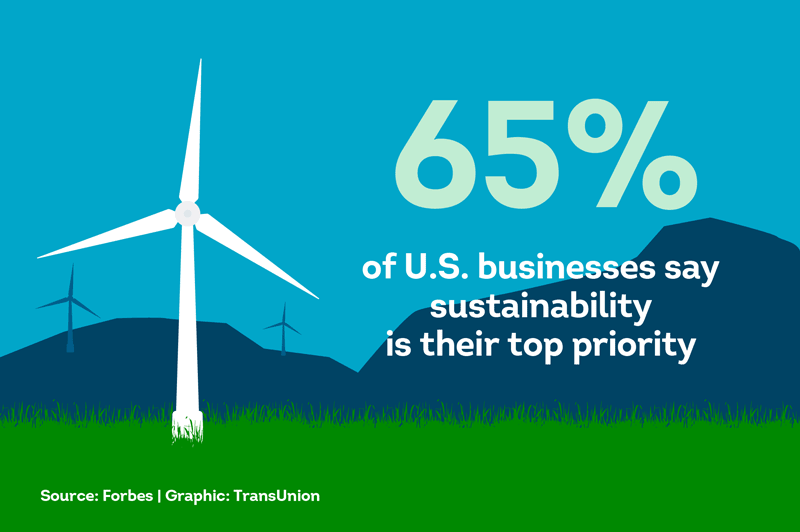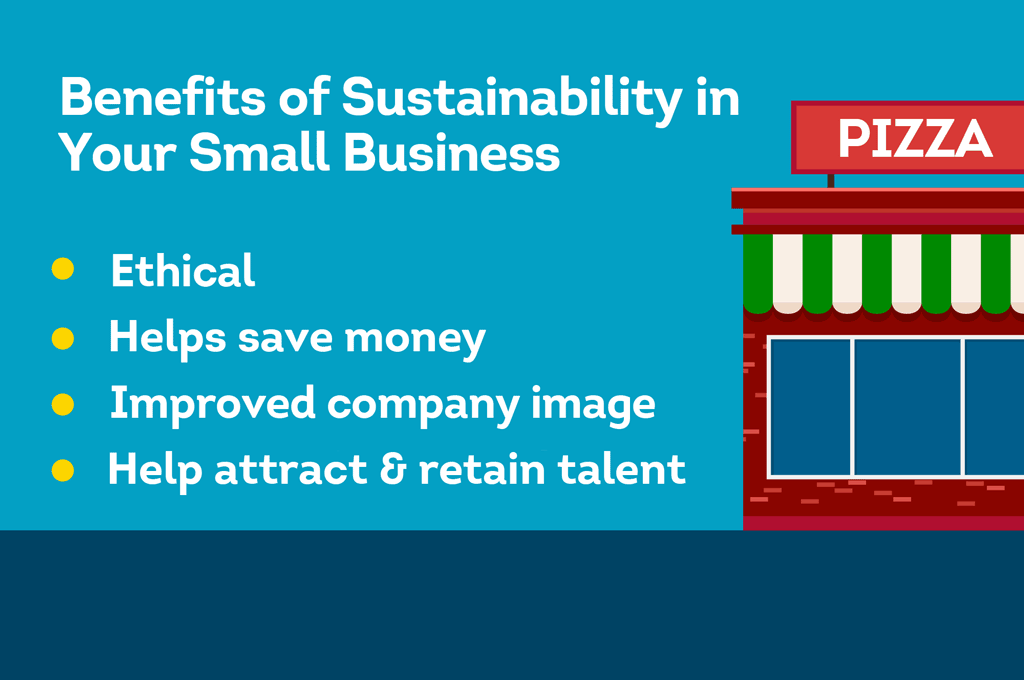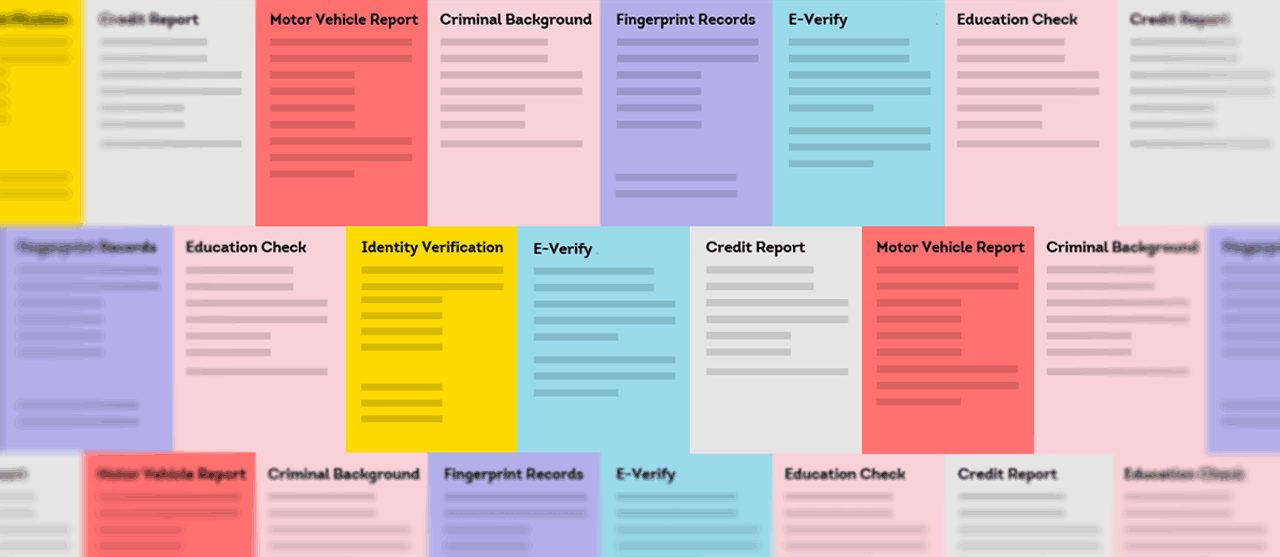These days, sustainability in business is becoming less of an option and more of a necessity. Besides corporate responsibility, sustainability is important even in small businesses because it can help boost profits, attract potentially great employees, help create more loyal customers, and help the planet. You can create a small business sustainability plan for your organization that includes specific action items to reduce waste, increase efficiency, make operations more sustainable, and inspire greater staff connections.
Disclosure: This content, except as otherwise indicated or stated on this site, is the property of TransUnion Rental Screening Solutions, Inc. This content is for educational purposes and for convenience only. Trademarks used are the property of their respective owners, and no endorsement or affiliation is implied. The information presented in this content is “as is” without warranties of any kind, and specifically is not represented to be complete and does not constitute legal advice, and is subject to change without notice. You are encouraged to check these terms from time to time for changes, and by accessing this site you agree to these terms and all terms listed. Laws and regulations may vary by state and locality. Consult your own counsel if you have legal questions related to your rental property practices and processes.
Disclaimer: Remember that this material is intended to provide you with helpful information and is not to be relied upon to make decisions, nor is this material intended to be or construed as legal advice. You are encouraged to consult your legal counsel for advice on your specific business operations and responsibilities under applicable law. Trademarks used in this material are the property of their respective owners and no affiliation or endorsement is implied.
Making a giant campfire can be exciting, but once you run out of wood, it will quickly fizzle––leaving you shivering in the dark. Similarly, without responsibly managing resources and mitigating environmental harm, businesses of all sizes are at risk of burning out––and taking the rest of us along for the ride.
A decade ago, “green” and “sustainable” practices were buzzwords that were considered bonuses or “nice to have” monikers for businesses, especially small ones. These days, with even the U.S. government marking climate change as a national security risk, sustainable business practices aren’t just optional perks. They’ve become near-mandatory imperatives to stay in the game.
The good news is that sustainable practices are good for business––and you’re not alone. According to Forbes, sustainability was top of mind for 65% of businesses surveyed. In addition, the vast majority considered their efforts successful in the survey year.
To help attract potentially great employees, small business owners should conduct pre-employment screening through services like ShareAble for Hires. Similarly, it’s essential for small business owners to help protect their livelihood by creating a sustainability plan and sticking to it.

This article covers what you need to know about revamping your candidate’s job application experience, including the top ten candidate experience best practices.
Here’s what you’ll learn:
What is Sustainability in Business
According to the Harvard Business School, sustainability in business means “doing business without negatively impacting the environment, community, or society as a whole.”
This means businesses should strive to understand the impact they have on the environment and community––both good and bad––and change any areas that cause harm. The responsibility for business sustainability applies to organizations of all sizes.
Sustainability initiatives often involve issues like:
- Mitigating climate damage
- Addressing Inequality and access issues, and
- Engaging with social injustice
Often, when businesses want to make these changes, they create Sustainability Action Plans. These plans usually involve internal reviews, defining goals, creating mindful outlines, and taking concrete actions to improve practices. Some changes might be at a high level, while others are down at the individual staff-member level and even show up in the employee handbook.
Why Sustainability is Important in Business
Sustainability in business isn’t just ethical. These practices can help drive business success. These benefits appear in many ways, including:
Helping Increase Revenue
Many studies have shown that sustainable business practices can help increase revenue. According to a survey from McKinsey, 83% of the C-Level respondents predicted sustainable practices will continue to generate more shareholder value over the next five years.
The Harvard Business School also provides a case study of five businesses that were successful through sustainability initiatives in a variety of ways. Many sought to reduce waste and find increased efficiencies in the supply chain.
Helping Attract and Keep Customers
According to the Forbes article mentioned above, 62% of consumers change purchase habits to opt for more sustainable options––and half of them are willing to pay more for a more sustainable product.
In the digital age, consumers are savvier and more connected than ever before. This means, if
you’re not keeping up with sustainability practices, your customers could find out––and likely could move on to a competitor.
Creating Long-Term Viability
Sustainability initiatives can help make companies more flexible and adaptable for the future. For example, an article from the University of Washington points out that, in a drought prone area, creating plans to closely monitor and manage water both helps the environment and helps makes a business more sustainable in the long run.
Environmental, Social, & Governance (ESG) LawsLike with labor department complaints and negligent hiring lawsuits, there are emerging environmental laws small businesses should be aware of. According to Thomson Reuters, a growing number of states are adopting Environmental, Social, & Governance (ESG) laws. It’s expected that this trend will continue.
To help prepare for the future, it’s a good idea to start reviewing and planning for sustainability measures now. That way, you’ll be ready to go if changes occur.
Pro Tip: When it comes to preparing for the future , it’s important to be organized. Learn more about the three employee files you should already be keeping.
Benefits of Sustainability in Your Small Business
In addition to helping create long-term growth, helping attract customers, and helping increasing revenue, there are several potential benefits to increasing sustainability efforts:
- Ethical. Many people consider protecting the environment the right thing to do.
- Help save money. Reducing energy, water, waste, and travel expenses can help save your company money.
- Improved company image. According to Forbes, sustainable products have a positive impact on a brand’s reputation and can be a great product differentiator.
- Help attract and retain talent. Today’s workforce likes working for sustainable companies. According to a 2021 Gallup Poll, about 70% of workers consider a company’s environmental record before taking a job.
Further, HR and payroll company ADP says that having green initiatives helps increase engagement and retention, and can help employees feel more connected.

With all of the benefits, it’s no wonder that so many companies now focus on sustainable practices and include regular sustainability reviews in their annual calendars.
Pro Tip: Sustainability practices are just one way to encourage great employees to stay. Discover other top retention strategies for small business owners.
What is a Small Business Sustainability Plan
A Business Sustainability Plan outlines sustainability-related findings, goals, intended actions, and benchmarks for a given organization. Any company can create a Sustainability Plan.
According to Constellation Energy, creating a Small Business Sustainability Plan involves the following steps:
- 1. Review your business and understand where you can make improvements. They recommend shifting your perspective from “take-make-waste” to “borrow-use-return” when assessing current practices.
- 2. Brainstorm solutions and opportunities. Involve your entire company in idea-generation, just don’t forget to include remote employees. Consider asking customers, too. Engaging the community to come up with the best ideas for reducing waste and creating efficiency can achieve more buy-in and connection.
- 3. Create a plan. Make sure the plan is doable and has SMART goals and benchmarks built in, so you can assess how successful it is down the line.
- 4. Take action. Implement the plan. Communicate changes clearly, monitor how things are going, build in reviews, and collect feedback as you go, so you can further iterate and help improve.
The Institute for Management Development further recommends aligning sustainability with your overall strategy. This way, the business strategy is sustainability, so you never have to choose between the two or put sustainability on the backburner in favor of growth.
Pro Tip: If your company has sustainability measures, make sure to tell new staff all about them when you onboard new employees.
What Is Greenwashing and Why You Should Steer Clear
The United Nations describes “greenwashing” as “misleading the public to believe that a company or other entity is doing more to protect the environment than it is.” It’s become a major problem globally.
If you decide to implement more sustainable practices, be honest about your efforts. If you just pay lip service to “green initiatives” but don’t follow through, your customers will notice––and likely take their business elsewhere.

The UN gives some examples of what might be considered greenwashing, including:
- Labeling products as “green” but lacking standards and definitions about what that means
- Implying a minor change is a major change or has an oversized impact
- Claiming to avoid processing or practices that are irrelevant to that product in the first place
- Being purposefully vague about materials or ingredients used
- Claiming to be on a track for a plan when none exists
- Misleading consumers about the “natural”, “green”, “organic”, or “sustainable” attributes of a product with technicalities or marketing language
According to the Harvard Business Review, consumers are definitely paying attention. And, companies that have been caught greenwashing their products reported dramatic drops in customer satisfaction and loyalty.
Ideas for Helping to Make Your Small Business More Sustainable
On the other side of greenwashing, there are many things––large and tiny––you can do in your small business to make a real, lasting impact on sustainability. These are collected and summarized from Nationwide, Forbes, Harvard Business School, the UN, and the other resources listed in this article.
- Recycle. Implement a company-wide recycling program to reduce the amount of landfill waste your company generates.
- Allowing remote work doesn’t just reduce your energy consumption rates and reduce fossil fuels from the commute, it’s one of the top ways to help attract Millennial and Gen-Z talent.
- Go paperless. Switch to digital records (just make sure to back them up), request forms, inventory handling, and customer interactions. Going digital doesn’t just reduce paper clutter, it also can save you big on material costs and reveal inefficiencies.
- Manage energy use. Install timed faucets, sensor lights, and LED bulbs. Shutting down computers and machinery overnight also conserves energy and helps save money.
- Provide sustainable options in the breakroom. Outlaw one-time use items in your breakroom. Provide mugs, plates, and silverware (you can even get these secondhand). Instead of disposable coffee pods, provide reusable pods and bulk coffee.
- Switch to sustainable packaging, where appropriate. For example, if you have a coffee shop, consider environmentally friendly cups and to-go containers.
- Donate money and time to sustainable initiatives. Whether you’re donating to local educational programs or taking your staff to plant trees or clean up a highway, local, sustainable initiatives are a great way to build connections while improving sustainability in your immediate community.
- Offer public transit benefits. Whether through formal pre-tax programs or reimbursing public transportation and bikeshare programs, this benefit can be a great way to encourage employees to use more sustainable methods of getting to work. You can also highlight this perk while writing your job descriptions.
- Consider buying used office furniture and other office necessities (like break room items), instead of buying new.
- Build-in efficiency checks. Do an annual or semi-annual sustainability and efficiency review to find areas of waste or opportunities for savings.
- Optimize supply chains to reduce waste and emissions. If you have delivery routes, when is the last time you reviewed them for peak efficiency Check all levels of your supply chain to identify opportunities for helping increase sustainability.
These are just a few of many ideas of how you can create more sustainability in business. Weaving them into your small business sustainability plan can have a great impact on the environment and your bottom line.
Help Prepare For the Future with ShareAble for Hires
As the earth’s temperature continues to rise, so does the importance of sustainability in business. These days, even job searches are impacted, as more candidates want companies that prioritize sustainability. While you may be excited to bring these passionate potential new hires into your livelihood, ShareAble for Hires helps prevent you from getting burned in the process.
Is your top job applicant responsible with their resources Employee credit checks can help you learn more about your candidate’s financial background, so you can make more confident hiring decisions. This is especially important if your role involves handling cash, private customer data, or proprietary information.
If you work hard to implement sustainability efforts, the last thing you want is an ill-fitting hire putting it all at risk. Criminal background checks scour over millions of records searching for a potential match to your candidate. Meanwhile, identity verification helps you confirm that your job applicant is who they say they are.
Get only the reports you need, exactly when you need them. Specifically designed for small business owners with only occasional screening needs, fast, flat-rate reports are delivered on-demand, just minutes after your job applicant consents. There are no subscriptions, monthly minimums, set-up costs, or any hidden fees. Simply create a free account and start pre-employment screening immediately.
You can’t always stop bad things from happening, but you can help prevent the worst. Help prepare your small business for the future with ShareAble for Hires.






